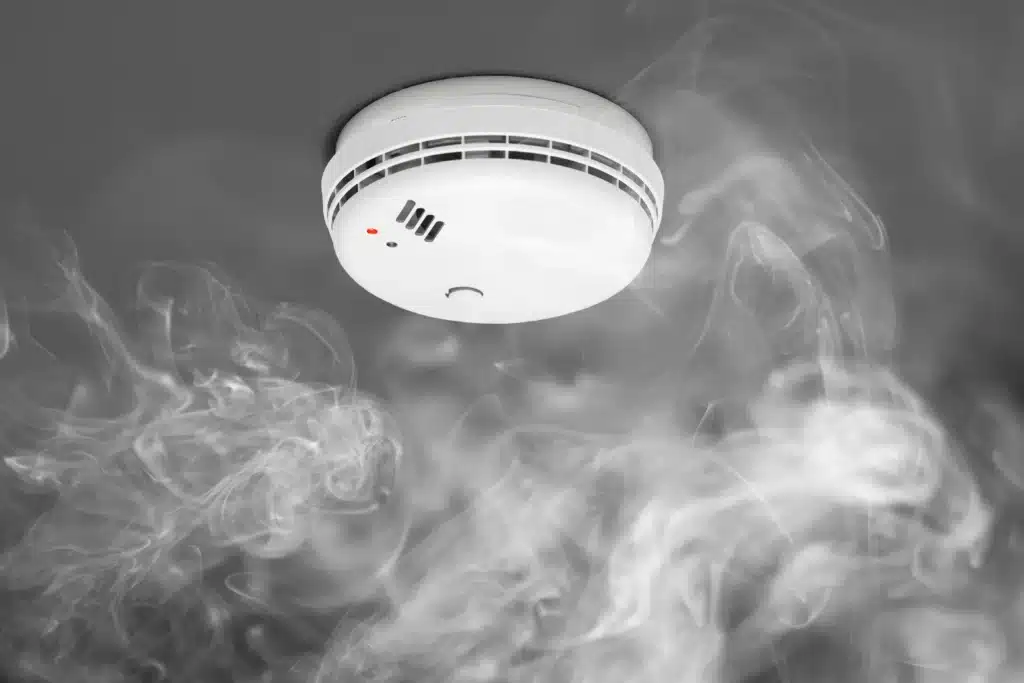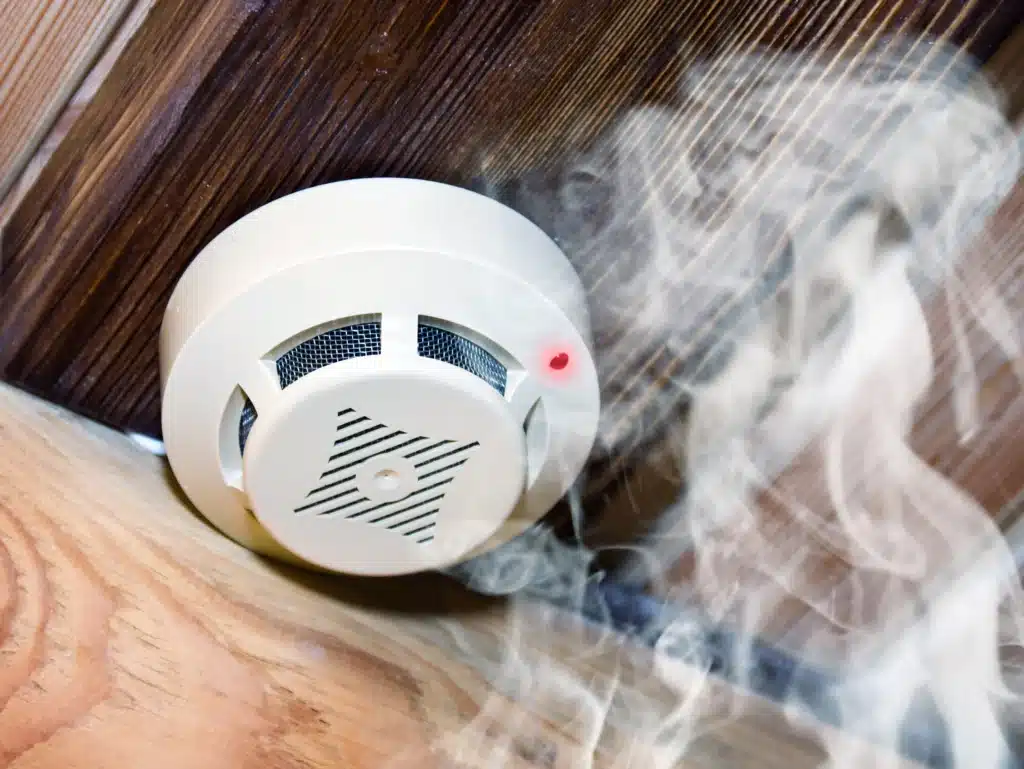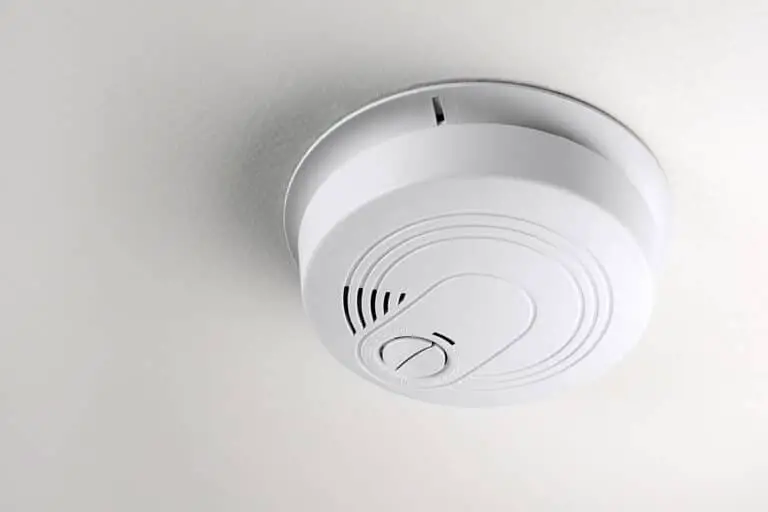Introduction
How To Make Smoke Detector Stop Beeping: Smoke detectors are an essential safety feature in every home, alerting us to the presence of smoke and potential fire hazards. However, there are times when these devices can become a nuisance, especially when they start beeping incessantly. The constant beeping can be frustrating and disruptive, leaving many homeowners wondering how to make their smoke detectors stop beeping.
Firstly, it is important to understand why smoke detectors beep in the first place. Smoke detectors are designed to emit a loud, high-pitched sound when they motion detection smoke particles in the air. This is a crucial warning signal that allows occupants to evacuate the premises and call for help in the event of a fire. However, smoke detectors can also beep for other reasons, such as low battery power or a malfunctioning sensor.
Second, if your smoke detector beeps, check the battery. Most smoke detectors beep when the battery is low to remind you to replace it. Simply replacing the battery should stop the beeping. Use high-quality, long-lasting batteries to keep the smoke detector working. Thirdly, if the battery is fine, a sensor may be faulty. Dust and dirt can clog smoke detector sensors and trigger false alerts. You can gently vacuum or blow out dust and debris from the smoke detector. Replacement may be needed if the smoke detector keeps beeping.

Can you silence a smoke detector from beeping?
Yes, it is possible to stop a smoke alarm from going off. By making a loud, piercing sound, smoke detectors are meant to warn people of possible fire dangers. Even though this feature is very important for making sure people are safe, there are times when the alarm needs to be briefly turned off. It’s important to remember, though, that turning off a smoke alarm should only be done in certain situations and never as a long-term fix.
People often desire to hush a smoke detector when it goes off due to kitchen smoke or shower steam. Frequent false alarms can be frustrating and disruptive. The “”hush”” or “”quiet”” button on most smoke detectors can temporarily silence the alarm. The detector’s front or side button may require a few seconds to activate.
Remember that you should only silence the alarm if there is no fire or smoke. Whenever in doubt, flee the building. False alarms may indicate a faulty smoke detector or a more serious issue, so investigate and fix it.
Some smoke detectors contain a timer that turns off the alert after a set amount of time. This function stops trivial incidents from setting off the alarm indefinitely. To comprehend your smoke detector’s functions, consult the manufacturer’s instructions or an expert.
How do I stop my smoke alarm from beeping every few minutes?
There can be few things more annoying than a smoke alarm that beeps every few minutes. Not only is it disruptive to your daily life, but it can also be a sign that something is wrong with your smoke alarm system. If you find yourself in this situation, there are a few steps you can take to stop the beeping and ensure the safety of your home.
First, know why your smoke alarm beeps. Most smoke alarms beep when the battery needs to be replaced. Low-battery smoke alarms beep to inform you to change the battery. If your smoke alarm is beeping, you may not have replaced the battery recently.
Second, look at what the maker of your smoke alarm says. How to change the battery in a smoke alarm varies, so make sure you follow the directions. Some smoke alarms have specific battery types and ways to change them. To stop the beeping, replace the battery the right way by following the manufacturer’s directions.
Third, if replacing the battery doesn’t stop the beeping, your smoke alarm system may have another problem. In this instance, a professional smoke alarm inspection and repair is recommended. They can detect problems and test your smoke alarm.
Finally, test your smoke alarm often to guarantee it works. Press the smoke alarm test button. If the smoke alarm doesn’t work, the battery may need replacing or there may be another issue. By frequently testing your smoke alarm, you may detect issues early and protect your house.
How do you turn off a smoke alarm?
Turning off a smoke alarm is a relatively simple process that can be done by anyone. Smoke alarms are essential safety devices that alert us to the presence of smoke or fire in our homes or buildings. However, there are times when we may need to turn off a smoke alarm temporarily, such as when cooking or when the alarm is triggered by steam or dust. In this article, we will discuss the steps to turn off a smoke alarm and ensure the safety of our homes.
First, find the smoke alarm. In many rooms, smoke alarms are mounted on the ceiling or walls. Their design and label as smoke alarms or detectors make them easier to notice. Note the smoke alarm’s placement to turn it off.
Determine smoke alarm kind. Smoke alarms are battery-operated, hardwired, or networked. Most smoke alarms are battery-operated and easy to turn off. Hardwired smoke alarms attach to the house’s electrical system and may require additional procedures to turn off. When smoke is detected, interconnected smoke alarms sound simultaneously.
Turn off smoke alarm. To turn off a battery-operated smoke alarm, remove the battery. This silences the warning. Turn off the smoke alarm circuit at the circuit breaker or fuse box for a hardwired smoke alarm. This temporarily disables the alert. In order to silence interconnected smoke alarms, you may need to switch off their electricity.
Fourth, test the smoke alarm. After turning off the smoke alarm, test it to make sure it works. Repower a hardwired smoke alarm or replace its battery. The smoke alarm should sound when you press the test button. Before restarting the alarm, replace the battery or fix the problem.
How do I stop my smoke detector from beeping without a battery?
If your smoke detector is beeping without a battery, it is likely that the device is experiencing a malfunction or a false alarm. Smoke detectors are designed to emit a loud, intermittent beep to alert you of potential fire or smoke in your home. However, if the beeping persists even after removing the battery, there are a few steps you can take to stop the noise.
- Check for dust or debris: Dust and debris can gather inside the smoke detector, causing it to malfunction. To fix this, carefully remove the smoke detector from its mounting bracket and clean the interior with a soft brush or compressed air. Follow the manufacturer’s directions and avoid liquids and abrasives.
- Reset the smoke detector: Some smoke detectors feature a reset button to stop beeping. Find a little button or pinhole on the device and push and hold it for a few seconds using a paperclip or small tool. Resetting the smoke detector should stop the beeping.
- Replace the battery: The beeping may persist after removing the battery, so replace it. Smoke alarms can malfunction due to low batteries. Use the manufacturer-recommended battery and follow installation instructions.
- Test the smoke detector: After cleaning, resetting, and replacing the battery, test the smoke detector to check it works. Listen for the loud, continuous beep when you press the test button. It may be time to replace the smoke detector if it doesn’t work or beeps.
- Contact a professional: If none of the above steps work, contact a professional electrician or the manufacturer’s customer service. They can analyze the issue and help you stop the smoke detector from beeping without a battery.
How long does smoke detector beep?
A smoke detector is an essential safety device that is designed to detect the presence of smoke in the air. When smoke is detected, the smoke detector emits a loud beeping sound to alert occupants of a potential fire. The duration of the beeping sound can vary depending on the type of smoke detector and the specific circumstances.
The majority of smoke detectors beep for 30 seconds when smoke is detected. These initial beeps are aimed to alert residents and get them to act. The beeping sound alerts people to smoke, not fire severity.
If the smoke detector is not reset or the air is not removed, the beeping sound may last longer. If the smoke detector is neglected or a fire is burning, this can happen. These conditions need addressing the smoke’s cause and checking the smoke detector.
Note that certain smoke detectors make a different sound when the battery is low. This sound is usually a regular chirping or beeping. If you hear this sound, replace the battery immediately to keep the smoke detector working.
Smoke detectors beep for many reasons. Low battery is a common cause. Smoke detectors beep to warn you when the battery is low. Smoke detector malfunctions are another possibility. If the smoke detector is outdated or damaged, it may beep to indicate replacement. Dust and debris can also cause smoke detectors to sound. Regular cleaning and maintenance can prevent this.
Smoke or fire may cause a smoke detector to sound. Smoke detectors detect airborne smoke particles and beep loudly to warn you. If you fear a fire, escape immediately after hearing these beeping sounds. Finally, some smoke detectors incorporate a carbon monoxide detector that beeps when it detects high quantities of this harmful chemical.
How can I troubleshoot a smoke detector that keeps beeping?
When a smoke detector keeps beeping, it can be quite frustrating. However, there are several troubleshooting steps you can take to identify and resolve the issue. Firstly, check if the beeping is due to a low battery. Replace the battery with a fresh one and see if the beeping stops. If the beeping continues, ensure that the smoke detector is properly installed and mounted securely on the ceiling or wall. Sometimes, loose or improper installation can cause false alarms.
If the smoke detector is properly installed and the beeping persists, it may be triggered by dust or debris. Clean the smoke detector using a soft brush or vacuum cleaner to remove any accumulated dust. Additionally, ensure that the smoke detector is not located near any sources of steam or excessive heat, as these can also trigger false alarms.
Are there any specific steps to follow to make a smoke detector stop beeping?
Yes, there are specific steps you can follow to make a smoke detector stop beeping. The first step is to identify the reason behind the beeping. Common reasons include low battery, dust or debris in the sensor, or a malfunctioning unit. Once you have identified the cause, you can take appropriate action to resolve the issue.
If the smoke detector is beeping due to a low battery, the solution is simple. Replace the old battery with a new one. It is important to use a fresh battery to ensure the proper functioning of the smoke detector. If the beeping continues even after replacing the battery, you may need to clean the sensor.
Can I disable the beeping sound of a smoke detector temporarily?
Yes, it is possible to temporarily disable the beeping sound of a smoke detector. However, it is important to note that disabling the beeping sound should only be done as a temporary solution and not as a permanent fix. The beeping sound of a smoke detector is a crucial safety feature that alerts you to potential fire hazards, so it is important to address the underlying issue causing the beeping rather than simply disabling the sound.
To temporarily disable the beeping sound, you can usually press and hold the “”test”” button on the smoke detector for a few seconds. This will silence the alarm for a short period of time, typically around 10 minutes. However, it is important to remember that this is only a temporary solution and you should not rely on it for an extended period of time.
If your smoke detector continues to beep after temporarily disabling the sound, it is recommended to troubleshoot the issue and address the underlying problem. This may involve checking the battery, cleaning the smoke detector, or replacing the unit if necessary. Remember, the beeping sound is there to keep you safe, so it is important to ensure your smoke detector is functioning properly at all times.
Are there any safety precautions I should take while trying to stop a smoke detector from beeping?
When attempting to stop a smoke detector from beeping, it is important to prioritize safety. Firstly, ensure that there is no immediate danger present, such as a fire or smoke. If there is any indication of a fire, evacuate the premises immediately and contact emergency services. It is crucial to never ignore a beeping smoke detector, as it could be a sign of a potentially life-threatening situation.
When troubleshooting a smoke detector, always follow the manufacturer’s instructions and guidelines. This may involve checking the battery, cleaning the unit, or replacing any faulty components. It is essential to disconnect the power source before attempting any maintenance or repairs on the smoke detector to avoid electric shock.
Additionally, it is advisable to have a fire extinguisher nearby in case of an emergency. Familiarize yourself with its operation and ensure it is in good working condition. It is also recommended to have an escape plan in place and regularly practice fire drills with all occupants of the premises. By taking these safety precautions, you can effectively address a beeping smoke detector while minimizing any potential risks.

Conclusion
Smoke detectors are vital to home safety. Smoke detectors warn residents of fire hazards. However, a smoke detector beeping for no cause might be aggravating. The constant beeping can disrupt sleep, induce anxiety, and even prompt the detector’s batteries to be removed, rendering it unusable. We’ll discuss why a smoke detector is beeping and how to silence it in this article.
One common reason for a smoke detector to beep is a low battery. Most smoke detectors are equipped with a battery backup system that kicks in when the main power source fails. When the battery is running low, the detector will emit a beeping sound to alert the user to replace the battery. To stop the beeping, simply replace the old battery with a new one. It is recommended to use high-quality batteries and to test the detector regularly to ensure it is functioning properly.
Another reason for a smoke alarm detector to beep is a buildup of dust or debris. Over time, dust particles can accumulate inside the detector, interfering with its sensors and causing false alarms. To fix this issue, gently vacuum the detector using a soft brush attachment to remove any dust or debris. It is important to avoid using harsh cleaning agents or spraying any liquids directly onto the detector, as this can damage the internal components. In some cases, a smoke detector may beep due to a malfunction or a fault in the system. If the beeping persists even after replacing the battery and cleaning the detector, it is advisable to contact a professional technician to inspect and repair the device. They will have the necessary expertise and equipment to diagnose the problem and ensure the smoke detector is in proper working condition.

